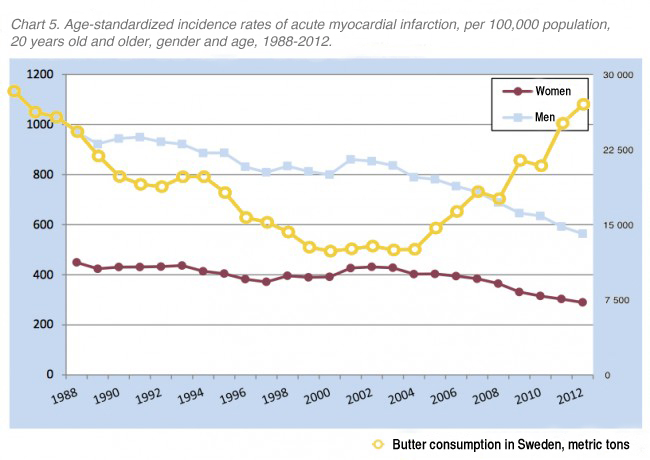
This graph from Andreas Eenfeldt (via Mark’s Daily Apple) shows heart attacks (left axis) and butter consumption (right axis) in Sweden over the last quarter-century. Heart attacks have been going down, at least in men. What interests me is that when butter consumption suddenly increased, starting in 2006, heart attacks went down more quickly. If you fit a straight line to the heart attack rates for 1988-2005, you will see that the remaining rates (2006-2012) are below the extrapolation of the line, both for men and women. The Swedes made other dietary changes when they started eating more butter (the butter replaced other foods, for example). Nevertheless, these data make it more plausible that if butter has any effect on heart attacks, it reduces them, the opposite of what we’ve been told.
I eat a half stick (60 g) of butter daily. It improves my brain speed. After I gave a talk about this, a cardiologist in the audience said I was killing myself. I said I thought my experimental data was more persuasive than epidemiology, with its many questionable assumptions. The new data suggests I was right — butter does not increase heart attacks. It also supports my belief that by learning what makes my brain work best, I will improve my health in other ways (such as reduce heart attack risk).
No doubt a low-carb high-fat diet is better than what many people eat, but I believe the never-eat-sugar part of such a diet is a mistake. There are plenty of reasons to think sugars eaten at the right time of day improve sleep. Whatever you think about nutrition, don’t get too comfortable.
Ditto on saturated fat, meat has it because that’s what mammals are made out of, including us. So maybe there is a situation where it’s bad but it can’t be universally bad, that wouldn’t make any sense
I’ve been following your blog and you have pretty much convinced me that sugar is important to your body’s health. However, I am curious as to what DOES cause the astronomical heart disease rates in America if it is not sugar. What do you think the likely cause(s) are?
“At the peak of the epidemic in 1970 there were 520 deaths per 100,000 per year in England and Wales, 700 in the USA, and … Thereafter there was an abrupt and apparently spontaneous decline, by 83% during the next 20 years to 1990. This is an important observation as during this time there was no widespread effective medical intervention.
I thought butter was demonized because it was a saturated fat, not that it, alone, was correlated to heart attacks. Publish the same graph against total sat fat consumption and you’ll have a stronger case to dissociate the two.
Ps there’s interesting work that charts the total lack of correlation between sat fat consumption and heart attacks in coconut producing (& eating) countries, so now there’s a bit of work investigating possible heart benefits from specific medium chain saturated fats, like coconut oil, in the diet.
https://www.amazon.com/WILL-HEART-ATTACK-Medical-Briefs-ebook/dp/B00C4C0XNG